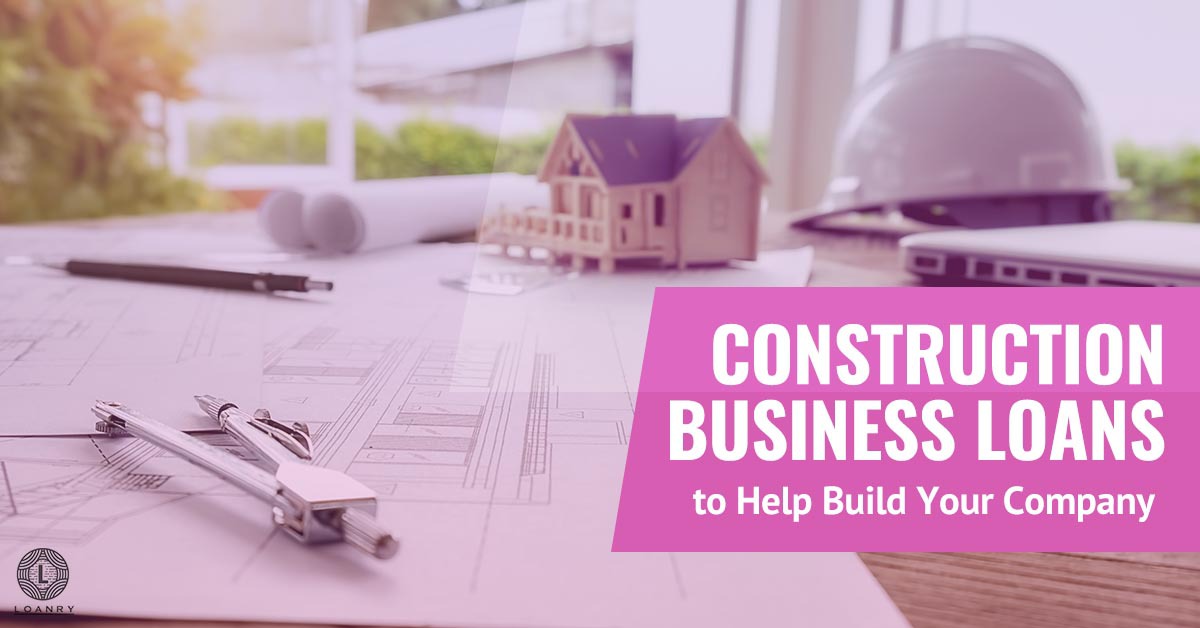Construction Business Loans to Help Build Your Company

Many of us envision our business going from our imagination to an actual brick and mortar building. We may be very aware of what we want the finished product to look like. Coming up with the funds to build our dream construction can be daunting, however. We may wonder where we will get the funding to bring the physical manifestation of our business into a reality. This is where construction loans come into play. These loans give us funding to physically realize the construction of our business. So, if you are interested in business finance, read on.
What are Construction Business Loans and Why Do I Need One?
A construction business loan is a loan to fund the construction or renovation of a physical property meant to house your business. You can take out this loan to develop the land as well as other forms of construction on business property. You can compare a business construction loan to a mortgage in some ways. However, it for paying for the construction or renovation of a commercial property instead of a personal or residential property. A residential mortgage is there to pay for a pre-existing home or the construction of a home.
If you’re a business owner who wants to renovate your business space or build a new location for your business from the ground up, you may need a construction business loan. Most business owners can afford to fund the renovation of their business space or the construction of it out of pocket. A business construction loan takes away the need to have money for a renovation or construction upfront. From a practical standpoint, you’ll more than likely seek a business construction loan if you want to build a new space for your business or renovate your existing space.
Requirements For A Construction Loan
Lenders don’t take business construction loans lightly. They understand how risky this type of loan can be. As a result, they require a lot of information upfront. Business owners seeking this type of loan will be required to furnish intricate details regarding your construction plan. These details are called the “blue book”. This includes a timeline for the construction project, floor plans, materials inventory, and suppliers and contractors. Besides, you’ll also need to supply information about the builder. This information will need to show lenders that you have found a reputable licensed builder.
As proof of a builder’s merit, you will need to supply the past and present projects of your chosen builder. Also, as stated above, you will need to provide a profit and loss report. Some lenders will ask for as much as a twenty-five percent downpayment. This works similar to a good faith payment and acts as insurance that you’ll be able to carry out the cost of construction, worst-case scenario. A property appraisal is also a key factor when it comes to lenders. They will determine the value of the property as a finished project. The property value is both location-based and market-based. Lenders focus on five key areas:
- Specific details about the construction
- A qualified builder
- Twenty to twenty-five percent Down Payment
- Your ability to repay a Loan
- Property value appraisal
How Do Business Construction Loans Work?
Lenders understand that the one size fits all approach can’t apply to business owners. Especially when it comes to business construction loans. Businesses are as unique as a fingerprint. Each has its unique wants, needs, and preferences. As a result, there are business construction loans to meet the wide and varied needs and preferences of different businesses. Business construction loans are unique in that they are funded differently from other loans. Conventional loans give the borrower access to the full loan amount immediately. You pay back the loan in pre-set installments over time.
One key difference between construction loans and conventional loans is how the interest rate is factored into the loan. Borrowers will only pay interest on the loans that have been funded. For example, if a business/borrower receives a construction loan for $250,000 but has only received $100,000, they will only pay interest on $100,000. As they receive more money from the loan, the interest will be based on how much they have received. Borrowers will never pay interest on funds they haven’t received yet. In a nutshell, a commercial construction loan is set up to have the borrower pay only the interest until the loan has been fully funded.
The Mechanics of Construction Business Loans
Construction loans follow a particular format. You can use the first part of the loan to cover the building, renovation, or reconstruction of a property. However, once the construction is complete, you use an end loan or permanent loan to pay off the short term initial loan. These loans are designed to complement the construction process and can run anywhere from six months to a few years. This type of loan is designed to be paid off once the construction has finished or it has been refinanced or sold.
Interest Rates and Fees
As with any kind of credit or loan, your interest will be based on your credit. Typically, business construction loans range from four to twelve percent. Of course, the smaller interest rates go to people with better credit. However, interest rates can be affected by more than just your credit score. The type of lender you choose will also play a role in the interest you pay. Typically banks have lower interest rates whereas hard money lenders typically have higher interest rates. So you should carefully shop business loans.
Business construction loans come with fees. However, the type of fees and the amount you will be required to pay will vary from lender to lender. The fee types and amounts vary by lender. However, some fees are common for most business construction loans:
- Documentation Fees
- Processing Fees
- Project review Fees
- Fund control Fees
- Guarantee Fees
How Do Lenders Determine Eligibility?
Lenders understand the risk factors involved with business construction loans. As a result, they pay attention to a few key areas. They will look at your credit score. Lenders tend to favor business owners who have a credit score in the high six hundred and seven hundred. However, each lender will vary in their eligibility requirements as well as what they’re looking for. However, the evaluation doesn’t stop there. Lenders will look at business credit as well.
Lenders will also take into consideration your business’s debt to income ratio as well. Most lenders are looking for potential business owners who have a DTI of forty-three percent our less. Logically speaking, the lower your DTI, the better.
What’s Next?
After the construction of the commercial property is complete, the loan doesn’t become due in one lump sum. Instead, the borrower can now get a commercial mortgage. As with any form of real estate, the newly constructed or renovated commercial building serves as collateral. You can use the funds from the commercial mortgage to pay off the commercial loan. The payments should be more affordable for the commercial mortgage.
Type of Loans To Research
Since we are talking about business construction loans, naturally, we will take a look at certain types of SBA loans you should know about. Besides that, let’s also look at other types of lenders you can go to.
SBA CDC/504 Loan Program
Businesses who are interested in this type of loan must meet the following requirements. The company must be comprised of fifty-one percent American owners or aliens with a green card. The business must be for-profit and NOT publicly traded. The company must operate within the US or US territories. And the business must operate in at least fifty one percent of the space. Also, the net worth of the company can’t exceed $15 million. Plus, profits for two fiscal years before applying for the loan can’t exceed five million dollars. It should also be noted that businesses that participate in real estate ventures aren’t eligible for this loan. This loan is geared for businesses that are:
- Sole proprietorships
- Partnerships
- Limited liability companies
- Corporations
Other Details Regarding SBA Loans…
SBA loans require a large amount of information and supporting documents for approval. These loans have enviable benefits but the approval process can be quite extensive. SBA loans will likely require you to furnish:
- A resume
- Business plan
- Business credit report
- Income tax returns
- Financial statements: Balance Sheets, Income Statements, Cash Flow, Bank Statements
- Accounts Receivable and Accounts Payable
- Collateral
- Legal Documents: Business licenses and registrations required for you to conduct business. Articles of Incorporation, Copies of contracts you have with any third parties
- Earnings Requirements
- Working Capital
SBA lenders want to ensure that they are funding business owners who will have the ability to pay back the loan. However, if they approve you for an SBA loan there are many benefits. SBA loans aren’t underwritten by the US Government. Lenders, community development organizations, and micro-lending institutions underwrite them and the average loan amount is near $371,000.
Bank Loans
Bank loans may be an attractive option for businesses seeking a construction loan. Although the terms will vary from bank to bank, it is possible to make a down payment for as little as ten percent. You can get fixed or variable interest rates and the repayment terms and down payment can vary. Businesses often have up to twenty-five years to repay bank-funded loans.
Mezzanine Loans
Mezzanine loans are for situations when the loan to cost ratio is lower. As a result, the business owner has to come up with more money. The loan to cost ratio is an issue. This situation occurs when building costs exceed the funds available for the project. You can use a mezzanine loan to cover the part of the construction project for which you do not have enough funds. This type of loan is secured through stock which can be converted to an equity stake. Mezzanine loans make it possible for a business owner to fund up to ninety-five percent of a construction project.
What Type of Loan is Best for Your Business?
This question is highly specific and dependent on the goals as well as the current financial situation of your company. However, banks, credit unions, and private lenders are SBA approved intermediary lenders. These lenders offer 7(a) loans, which may be a good option for your company. SBA-approved non-profit CDC provides funds for CDC/504 loans.
Banks and credit unions are a good place to shop for business construction loans. They offer SBA loans, traditional loans, and mezzanine loans. You can also seek funding through hard money lenders. However, the interest rates for these types of loans will probably be higher. These lenders are private and usually offer short term funding. These loans usually don’t require much money upfront and usually issue funds much quicker than more conventional lenders.
The Application Process
Once you’ve decided on the lender, you will need to prepare your documents for the loan application process. Plus, you will also need to provide specific information regarding your construction project. This information includes a building plan with specs and designs. You’ll also need to provide projected expected project cost sand estimates for contractors, materials, and any other miscellaneous expenses. They will more than likely ask for personal AND business tax returns, profit and loss statements, balance sheets, bank statements, income statements, and debt schedules.
Your credit score will also be considered. Keep in mind that negative like bankruptcies, foreclosures, defaults on loans, and other credit blemishes will be scrutinized. Some of these negative blemishes may automatically disqualify you. As a result, it’s a good idea to provide and explanation for the negative information. This can be a lengthy process for the lender and more documentation may be required. The final steps include the underwriting process and approval.
Can I Get a Construction Loan with No Money Down?
Most commercial construction loans will require at least a ten to thirty percent down payment. However, an SBA Microloan doesn’t, although you will have to come up with collateral. The SBA offers various no money down loans that require some form of comparable collateral. If you meet the eligibility requirements, you may be able to secure a no money down loan if the amount you want to fund fits within the SBA’s microloan funding amounts and criteria.
How Much Will Poor Credit Affect Business Construction Loan Approval?
The short answer to this question is “a lot.” Bad credit is a FICO credit score of 629 or less. Business owners with poor credit are a greater risk than their business counterparts with good or fair credit. This is because they are more likely to default on a loan. This is why business owners with poor credit may find it difficult to secure a traditional loan. However, some alternative lenders may give you a shot. Keep in mind that they will probably offer you high interest rates. Also, some of these alternative lenders may look at other things besides credit when determining your creditworthiness. Those areas could include including business revenue or length of time in business. There are five alternative lenders well known for funding business owners with less than spotless credit. They are:
- BlueVine: FICO Credit Scores As Low As 530
- Kabbage: Alternative Qualification Requirements
- RapidAdvance: New Businesses
- LoanBuilder: Large Loan Amounts
- Fundbox: Short Loan Terms
These alternative lenders stood out because they were rated highly in three areas. They include customer service, qualification requirements and loan options. These areas may be beneficial in helping businesses with bad credit narrow their search and find a loan that will meet their unique circumstances Also, it should be noted that most lenders will look at your credit as well as your business credit. Furthermore, if you haven’t established business credit your credit will be the only gauge of your creditworthiness.
Closing Words
Building a commercial structure for your business is exciting. The new space your business will occupy will house the hopes and dreams of your company. As a result, it’s a good idea to know where you stand when it comes to securing funding for your company. Most Business construction loans require a down payment., as well as other constraints. Understand your why as well as the various other reasons why a construction loan is a necessity for you.
Have you outgrown your space? Has your business location suffered from some form of damage or loss? Is it time to perform renovations on your old commercial space? Regardless of the reasons, understand them and zero in on the best types of business construction loans for your company. A new commercial space is a common goal for many businesses. However, to secure the right funding for your situation, it’s necessary to dig deep. And take an honest look at what type of funding would be best for you to pursue. Loanry can always help you connect with online lenders, if this is the road you decide to take.





